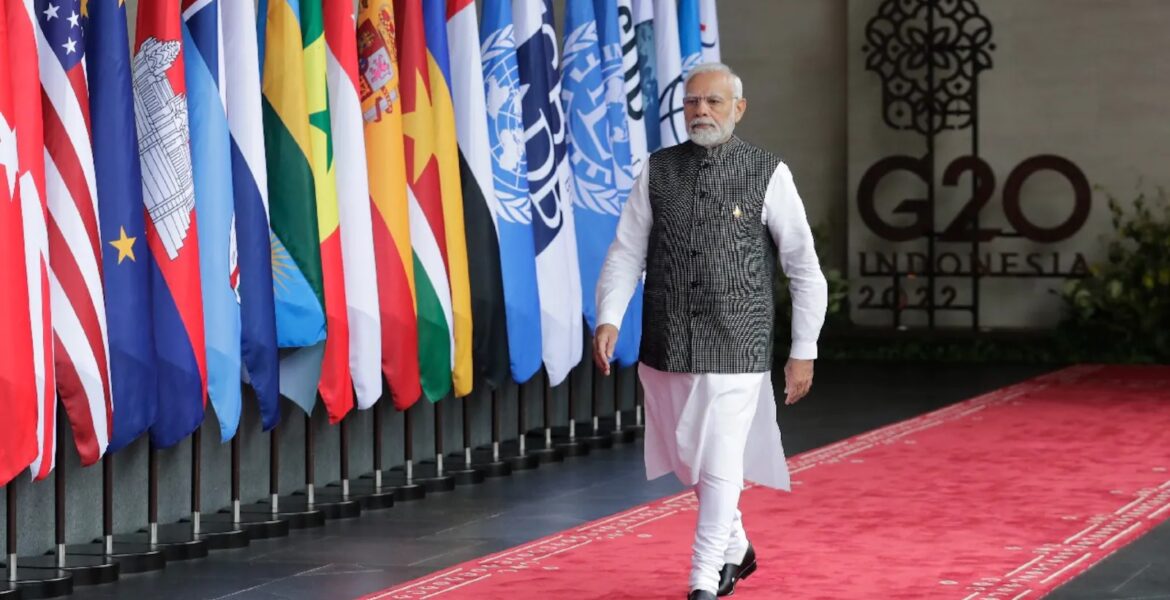Comprising some of the world's largest economies, the G20 or the Group of Twenty, is an intergovernmental forum for 19 countries and the European Union. The group of nations included in the G20 account for almost two thirds of the global population, 80 percent of world GDP and 75 percent of international trade. The forum addresses key issues related to the global economy such as inclusive growth, climate change and green development, sustainable development and technological infrastructure.
Last year, in December, India took over the Presidency of the G20 from Indonesia. In keeping with the Vedic tradition, India’s theme for the G20 is Vasudaiva Kutambakam or One Earth, One Family, One Future.
At the time of India’s G20 Presidency, the G20 Troika would be comprised of three emerging and developing economies namely Brazil, India and Indonesia, the first in a long time, thereby giving greater leverage to the Global South to address key concerns such as climate change, healthcare, anti-corruption measures and financial inclusion of the marginalized.
The working mechanism of the G20 is divided into two parallel tracks: the Finance track and the Sherpa track and other Engagement groups composed of civil society and independent bodies. The Finance track covers eight sectors such as health finance, global macroeconomic policies, financial inclusion, international taxation, sustainable finance, international financial infrastructure, infrastructure financing and financial sector reforms.
The Sherpa track covers twelve streams such as employment, agriculture, digital economy, culture, development, tourism, health, education, trade and investment, environment and anti-corruption.
India’s priorities at the G20 forum are six fold - namely Green development; climate finance and lifestyle for environment; Accelerate, inclusive and resilient growth; Progress on Sustainable Development Goals (SDG); Technological transformation; and, Digital Public Infrastructure, Women led development and Multilateral institutions in the 21st century.
A series of cultural events marked the turn of India’s presidency wherein 100 ASI monuments were lit up, sand art of India’s G20 logo in Puri, Odisha was created, Jan Bhagidhari activities were encouraged and G20 was showcased at the Hornbill festival in Nagaland.
Over 200 meetings covering more than 30 streams will be hosted by India. Already, the first G20 Finance and Central Bank Deputies meeting took place in Bengaluru on December 13, 14, 2022 whereas the Development Working Group under the Sherpa track met on 13 December 2022.
India can play an important role during its G20 Presidency by addressing key issues such the adequate and inclusive representation of emerging economies in global forums such as the International Labour Organization (ILO), World Trade Organization (WTO), World Bank, the United Nations (UN) and the International Monetary Fund (IMF).
As far as growth and development is concerned, according to a World Bank report, the global growth rate is projected to slow down to 1.7 percent in 2023 while the World Economic Forum underlines the changing economic landscape, low growth, low investment and low cooperation, ‘making human development decline after years of progress’.
Due to continued disruptions in food and energy sources and global inflation also flaring up due to measures such as restrictions and export bans imposed by at least 30 countries coupled with other supply chain disruptions and extreme weather conditions, the dire macroeconomic environment is resulting in a ‘cost of living crisis’.
For example, across Africa, predicted droughts and water shortages may cause livestock death and plummeting harvests.
To avoid inflationary pressures, governments across the world may embark on a tightening of interest rates as can be figured out by the fact that nearly 90 percent of banks monitored by the Bank for International Settlements raised interest rates in 2022.
With capital flows globalized over the recent decades, the emerging and developing markets are more exposed to the specter of rising interest rates. Investors have already withdrawn 70 billion dollars from emerging bond markets by October 2022 because heightened volatility drives up the demand for US assets.
Another facet of life affecting the world today, climate change, should also be addressed by India.
Global ambitions to limit warming by 1.5 degree Celsius are unlikely and the chances of breaching the target as early as 2030 stands at 50 percent, according to the Intergovernmental Panel on Climate Change (IPCC), whereas current commitments made by the G7 suggest an increase of 2.7 degree Celsius by mid century, in stark contrast with the goals outlined in the Paris Agreement.
The arena of climate change is contentious in that policy makers have to balance trade offs between energy security and sustainability.
A much needed agreement to phase out fossil fuels failed to reach consensus during negotiations at the Conference of the Parties of the UNFCCC(COP27), despite the risk of stranded assets and security challenges.
Much of the corporate world is yet to manage or assess its climate risks while there is also a dearth of policy formulation, regulation and enforcement leading to more disruptive climate activism.
Other key issues that can be addressed by India include social polarization, or the loss of social capital leading to loss of collective well being and economic productivity.
India should offer innovative solutions to the aforementioned problems so that the benefits of inclusion can cascade to the most vulnerable sections.
Abhishek Ranjan is the Founder and Director of Red Lantern Analytica.
Stay updated with the latest news from Greece and around the world on greekcitytimes.com.
Contact our newsroom to share your updates, stories, photos, or videos. Follow GCT on Google News and Apple News.


